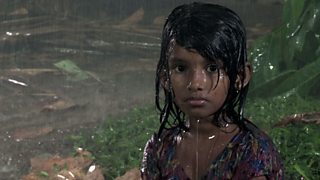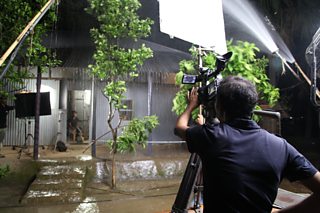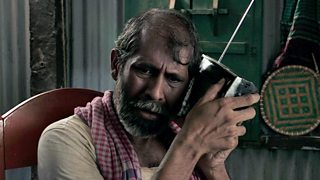Responding to Cyclone Mahasen
Mazharul Islam
Head of Projects, Governance and Resilience
Tagged with:

A still from �������� Media Action's TV public service announcement about cyclone preparedness.
��
��
Dhaka, Sunday 12 May 2013, 8am (Bangladesh Standard Time)
Amongst the usual ebb and flow of general strikes and political protests, news of an approaching cyclone reaches �������� Media Action’s office in Bangladesh. Details are sketchy and conflicting – a direct hit within a couple of days or a blow in a week or more. No-one’s really sure.
One thing is for certain though: Bangladesh is one of the most vulnerable nations in the world when it comes to cyclones. The last big one to batter the country – cyclone Sidr in 2007 – killed thousands of people and the effects are still being felt today in areas where sea water destroyed agricultural land.
So thoughts immediately turn to how the �������� Media Action team can help prepare the country for the worst. We’re lucky in that our specialist disaster preparedness team are in the country preparing for a training course that's aiming to help us to work together with government, humanitarian agencies and the wider media sector to prepare for future disasters.
But it seems that we now need to put that training into practice earlier than expected.��
Sunday 12 May, 8pm ��
In any emergency situation, consistency of messages is key: we need to make sure that the information that people are hearing from the media is accurate and useful and that it matches the official government messages and advice being given by humanitarian agencies on the ground.
So, after a day consisting of emergency meetings with the government's disaster management department, state and community broadcasters and the major NGOs, now we understand the key messages that the public need to hear.
And the cyclone has a name – Mahasen. It's time to get to work.
Monday 13 May, 9am ����
We start with radio.�� It's the quickest and simplest medium to produce and, although radio listening in Bangladesh is not huge, it's at least partially localised so an important way to get messages direct to the communities on the coastal belt who are most likely to be affected in the coming days.
Scripts are agreed and contradictions resolved: should people take their cash with them to the cyclone shelter, or wrap it up and bury it in the fields? Advice differs, and we need to try and be consistent. The disaster management department confirm that burying money is a bad idea, so taking it with is the way we go.
By 8pm, recording can get started. But the choice of voices is limited and Serajum Munira, our mobile and web production manager, is the only female Bangla speaker left in the building. Luckily, she turns out to have a good radio voice – who knew?
Tuesday 14 May, 8am
The first eight radio public service announcements (PSAs) are on air, across six community radio stations, two independent stations and the state broadcaster. These eight short messages including details of when to take shelter, what to take along and how to safeguard seeds and livestock.�� Three more "evacuate now" PSAs are ready and waiting to go out and will play if the situation gets worse and the government issues an evacuation order.
The cyclone looks like it's still a couple of days away so our thoughts turn to television. We’d like to make something for the state broadcaster, Bangladesh Television (BTV), to help refresh the somewhat dated cyclone preparedness content they've been broadcasting. Overnight, a concept for a 90-second piece has emerged. We’ll tell the stories of three people in a rural area hit by a cyclone to stress the implications of ignoring the warnings.
We have to film tomorrow, so we need to find a village to film in, a cast, crew, props, costumes, lighting, wind and rain machines. But today is a general strike – a common and often violent event in Bangladesh with the elections approaching – so travelling across the city is risky. As the team carefully pick their way through the disruption and arrive at the office, we assemble the pieces of the jigsaw and, by nightfall, have an approved script and a cast and crew of 60 booked and ready to hit the road at 6am.
Wednesday 15 May, 9am ��
The cyclone is now 36 hours away and the television team work quickly to film in a village a few hours north of Dhaka.
Back in the office, the radio crew are translating and recording radio PSAs into local dialects, including preparing messages that will be broadcast on loudspeakers inside the camps hosting Rohingya refugees in the south-east of the country.
There are also five new PSAs to be recorded, mixed and distributed which carry key messages about water purification, first aid and other things that people will need to know if the cyclone hits badly. We want to get these out to broadcasters soon, in case the cyclone takes out internet connections in parts of the country and we’re unable to communicate with them later.

The Bangladesh team film the TV PSA.
Wednesday 15 May, 11pm
The television team is back, bedraggled and exhausted after a hard day's filming. The edit's already underway – thanks to make-shift edit suites constructed in the village and in the back of the bus on the way home – but it’s late and we need to get it finished. So, after a cup of cha, it's back to work.
There's no time to lose as the cyclone continues to get closer and, overnight, we assemble, edit, colour-grade, dub and mix, creating a piece that will make sure affected populations have the best possible chance of understanding the cyclone warnings. As the sun comes up, the finishing touches are put in place and the tapes make their way around the city to broadcasters.
Thursday 16 May, 8.30am
The TV PSA is now on-air and, as the wind builds and the rain sets in, the vital messages play another dozen or more times across BTV and a handful of cable and satellite channels.
Those members of the exhausted �������� Media Action team who aren't in bed breathe a sigh of relief: the content is on-air but, more importantly, the cyclone looks like it’s not as bad as expected.
Fishing villages on the southern coast have been lashed with heavy rain and fierce winds but, as the storm passes and our post-disaster PSAs start playing on stations in the affected areas, it's clear that it could have been a lot worse.
So, what did we achieve?
Besides 38 radio PSAs in three languages and an effective TV PSA watched by millions, we've learned a huge amount about how we can be better prepared to help.
The contacts we've made and the experience we’ve gained will be hugely useful if Bangladesh faces natural disasters in the future.
As our thoughts turn to whether there are longer-term ways we can work with the communities affected by Mahasen, the role of media as a vital part of the mix in disaster situations is suddenly a lot more real to us all.
Let's hope that Bangladesh is spared from future tragedies. ��But, in the event that it isn't, we stand ready – and more able than ever – to assist.

Related links
